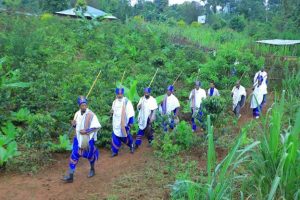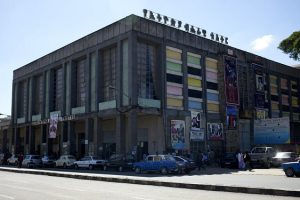Short Story
Tekola and Sirage were classmates at Addis Ababa University. They were economics majors. On the surface, they appeared to be equally intelligent, but Tekola’s incentive to work hard was much weaker than Sirage’s, because Tekola’s father was one of the TPLF’s political bigwigs with a fortune estimated at nearly a billion Birr.
Tekola wore designer clothes, had a car and carried a lot of cash he could spend as he wished. At the university’s café, Tekola used to laugh heartily but also sometimes mockingly when Sirage dipped into his pocket to settle the bill.
Tekola usually also dipped his hand into his jacket inner pocket, but mischievously waited until Sirage produced his money, which was typically no more than a few 10 and 5- Birr bills. Then Tekola would whip out a wad of 100- Birr notes and give one of them to the waitress (most of the waitresses were ladies) who would usually complain: “Oh, Tekola, I have no change for that”, which he realized was a trick to keep the huge change. But he did not mind the thinly- veiled trick. In fact, he rather enjoyed it and would typically say: “Ok, you can keep the change”, upon which the waitress would knowingly giggle to her heart’s content, and shove the massive tip into the pouch on the front of her apron. Tekola would then turn to Sirage and say: “She can now date you!”
Speaking of dating, that was the bane of his academic performance. He had so many dates, all of them stunningly beautiful, that the amount of time he spent at Kennedy Library was no more than a tenth of what Sirage did, which was why Sirage was a straight- A student whereas Tekola’s result sheet exhibited a despicable mixture of D’s, C’s and B’s. To his credit, though, he never used his father’s massive influence to pressure the typically timid university lecturers to doctor his grades.
One day, as Tekola and Sirage were going to one of their economics classes, Sirage stopped at the notice board to see if there was anything new. Indeed, there was. A notice was posted which read: “Those of you who wish to participate in the upcoming debate, please register at the office of the Debating Society of A.A University. The topic of the debate this time around is: ‘Democracy and Economic Development by Force!’ Please indicate whether you are for or against the proposition.” Surprisingly, Tekola was more excited about it all than Sirage, who was considered not only by his classmate including Tekola but also nearly by all of his schoolmates to be a “library mouse, a crammer, a bookworm and a slogger.” So, Tekola proposed to Sirage: “Let you and me debate on opposite sides of the topic. I’ll go for the proposition, i.e. in favour of the topic.”
“Ok, but I know that if you argue the point well enough you can easily beat me. I will take the challenge anyway,” said Sirage. Then, they both proceeded to their economics class, the lecture topic of which was, “Comparative Development Strategies.” The class looked confused when the lecturer, the renowned Ethiopian economics Prof. Taye Birhanu, concluded his brilliant presentation by saying: “It has become old- fashioned nowadays to speak of comparative development strategies. There is only one development strategy and that is capitalist development strategy, whether it is predominantly private or state capitalist development or a balanced mixture of both. China may be characterized as predominantly state- capitalist and America predominantly private –capitalist, but the fact of the matter is that they are both essentially capitalist. Don’t be fooled by the name Communist Party of China. That is a sort of futuristic moniker to accommodate an economic and political system that
may well emerge when and if capitalism completely exhausts its growth potential. By the way, any objective thinker seems to have no plausible alternative other than to imagine something they may well have to call communism.”
Hands shot up in the air to ask questions, but the Professor had only time for one question which was that of Tekola who simply blurted out, “How about socialism?” to which the Professor responded dismissively, “Didn’t I tell you that’s just a non-starter?” and ended the class for the day and left. Of course, then the most eagerly anticipated thing was the great debate organized by the Debating Society of the University. The occasion seemed all the more significant as the straight –A student and presumptive candidate for the Chancellor’s Medal Sirage and the spoilt Jolly Jack Tekola were participating in the debate. The great day did arrive, as all red-
letter days do eventually arrive, and Sirage and Tekola took their respective labeled seats at the long rectangular table on the stage in the conference hall of the Eshetu Chole Building on Sidist Kilo Campus.
The moderator of the debate made the usual opening statement and the great clash of ideas began with a bang. Surprisingly, the first discussant to speak was Tekola and he presented his line of argument coherently in the following words:
“A very long time ago, the Ethiopian people lived and toiled in scattered clusters. Then, warlords arose from their respective groups and fought each other with war weapons of the age. The victors congregated the human clusters to form a huge army and embarked on the protracted journey of nation-building. The advantages of congregation became clear as it helped the victors not only to raise a strong army but also to erect massive structures such as obelisks and amphitheaters. Hence, the scattered human groups were congregated by relatively wise warlords who recognized the advantages of human congregation. In actual fact, the scattered human clusters were joined together by force for the sake of benefitting from the advantages of human congregation.
The Ethiopian people today are infinitely more knowledgeable than those ancient human populations, but unfortunately they do not seem to fully realize the advantages of democracy and rapid economic development and the sacrifices necessary to make to realize their full potentialities. A great deal of modern scientific knowledge is required to fully understand the benefits of democracy and economic progress. Democratic concepts of human dignity, freedom and the rule of law and economic principles including value creation, wealth and income distribution, etc. can only be known and understood through formal hard thinking and study in schools, colleges and universities.
I do not personally believe that the Ethiopian people in general are fully aware of the sacrifices necessary to be made in terms of hard work and study in order to fully benefit from the advantages of democracy and economic development. Hence, it stands to reason to argue that these sacrifices should be imposed on the people by force in order to fully actualize the benefits of democracy and economic development as the sacrifices necessary to realize the advantages of human congregation were imposed on ancient Ethiopian populations a very long time ago. Thank you for listening to my argument so patiently.”
A deafening round of applause reverberated across the conference hall and beyond and this gave Tekola confirmation that his poor grades were a reflection of the small number of hours he spent at Kennedy Library and not of his innate mental capacity. Next in line to debate, as anticipated, was Sirage who flashed his friend Tekola a sly smile and whispered, “Congra! You have won, but I will try anyway.”
Sirage launched his debate with witty soundbites: “Democracy by force is a contradiction in terms, a veritable oxymoron! Economic development by force is slavery!” The audience applauded him for the smart opening salvos. Sirage continued with the rest of his arguments as follows:
“There is no need to use force to teach democracy to the people and have them practice it by doing. All one has to do is just be honest and knowledgeable. The problem is usually with the politicians, particularly those who happen to be in power, not with the people. It is true that dishonest politicians can con the people with false promises and land and money gifts, especially incumbent politicians. As for economic development the best strategy is obviously not force, but the right moral and economic incentives.”
Other debaters voiced issues revolving around the basic elements raised by Tekola and Sirage with slightly varied nuances of emphasis and de-emphasis. But suddenly the proceedings were interrupted by loud shots and salvos of gunfire and heavy artillery from the direction of Arat Kilo. The assembled people rushed to the exists and some scrambled over the windows. Soon word reached Sidist Kilo that a military coup was underway at the palace.
In the evening breaking news, the Sandhurst-trained General Gobena Taddesse appeared on Ethiopian Television and made the following historic speech:
“My fellow Ethiopians, be calm and stay sober. Everything is under control. We must put an end to infantile political gangsteism in our beloved Ethiopia. The Ethiopian youth have been deliberately thrown back into ignorance and are now almost completely devoid of useful knowledge and skills. Being unable to engage themselves in the productive process of employment creation, they are now fighting over unwrought natural resources of God’s creation, the prime preponderance of which has been appropriated by undeserving social parasites of all hues. We shall re-educate and re-train our youth so that they shall be in possession of useful and marketable knowledge and skills. The necessary accompanying basic resources including land and credit shall be made conveniently available to them. We believe that benevolent force should be used in the initial stages of democratization and economic development.
The Ethiopian Herald June 28, 2020
BY TEKLEBIRHAN GEBREMICHAEL





